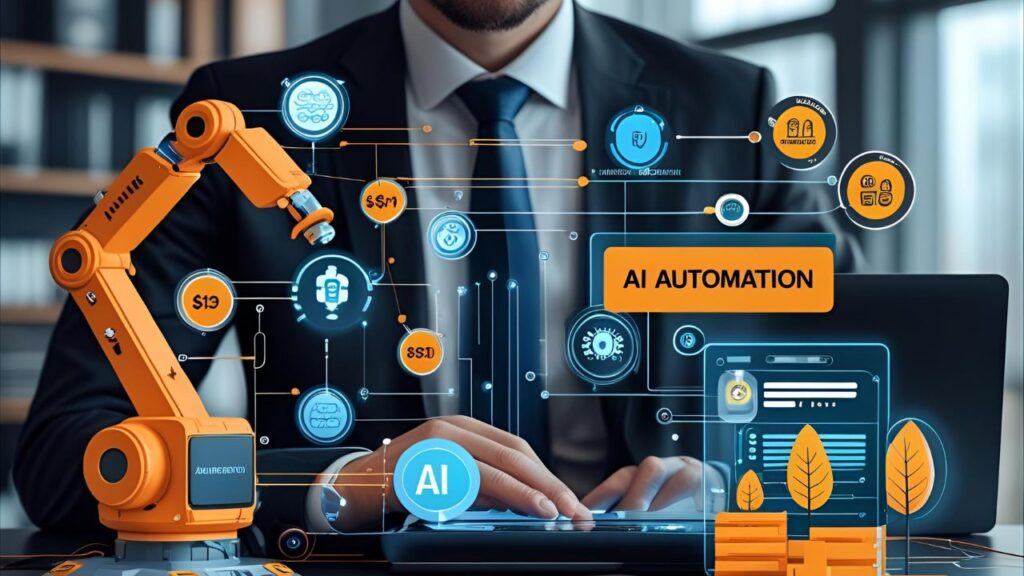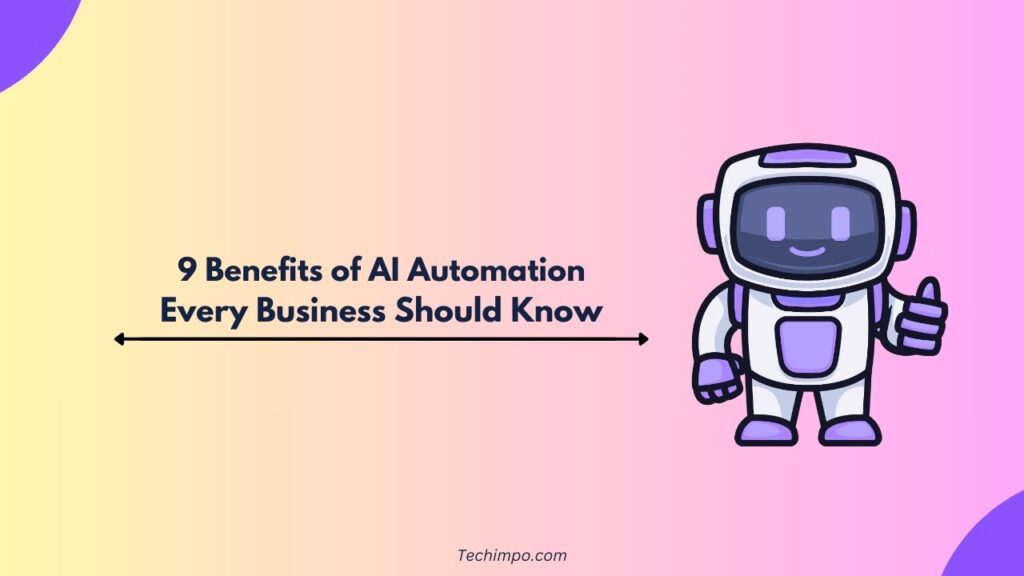Artificial Intelligence (AI) has long passed the stage of technology labs and academic publications. It is an effective business tool that is used today to increase business efficiency, decrease costs, and alter how customers experience business.
AI automation, or the automation of routine and time-consuming tasks with the help of AI technologies, is one of the most powerful implementations of AI.
In terms of optimization of business operations, AI automation is enabling companies to work in a more efficient and quicker way, as well as being able to offer individual customer service. The competitiveness of a market is such that firms that are early adopters of AI automation can be more innovative, make superior decisions, and be more adaptable to change.
In this post, we will understand what AI automation is, the benefits of AI automation, and how it has become a necessity in contemporary businesses.
What is AI Automation?
AI automation provides a blend of traditional automation and the intelligence of AI to develop systems that can both complete tasks and make decisions, and become adaptive over the course of time.
In contrast to standard automation that acts according to the same predetermined rules, AI automation is based on learning and is constantly, through machine learning, natural language processing, computer vision technologies, and others, able to improve its own performance by learning something new.
It is capable of supporting such complicated tasks as analyzing unstructured data, forecasting, and customizing interactions with customers. Examples include:
- Chatbots powered by AI provide answers to customer questions.
- Production methods of predictive maintenance.
- Automated anti-fraud in money transactions.
AI automation helps free employees to engage in more strategic duties and work while edging out the possibility of the timely completion of higher-quality tasks in their duties, as they reduce the number of hands that are required to comply with manual intervention.
9 Benefits of AI Automation
With speed, intelligence, and precision, AI automation services change the face of business operations. Its indispensability in the contemporary competitive business world will be evidenced by the following 9 AI automation benefits in terms of productivity and customer experience, among other elements:
1. Increased Efficiency and Productivity

The automation of AI accelerates those processes that would need to be completed in hours or days. Entries like data entry, report, or processing invoices can be accomplished within a few minutes with only minimal mistakes.
This allows the employees to spend time on activities of greater value, one involving problem-solving, creativity, and human judgment. It has resulted in measurable productivity gains among departments.
2. Significant Cost Savings
Automation of the process reduces labor directly. The automation will also decrease costly mistakes and streamline resource use, and minimize waste.
To give an example, a delivery company can apply AI in order to optimize delivery routes and thus save up some costs on fuel and delivery delays. These savings on operations enhance the profitability over a long period of time.
3. Enhanced Accuracy and Reduced Errors
Human nature being what it is, there is the likelihood of errors during tasks that are either tedious or data-intensive. AI automation can execute its tasks with a degree of precision that is always consistent, as there is no exhaustion.
This lowers compliance risks and achieves quality output in areas that require precision, such as healthcare, finance, and manufacturing.
4. Improved Customer Experience
AI automation can experience quicker customer relations and specific contact. Virtual assistants and chatbots will be able to answer questions on the fly, advise on products depending on the purchases made in the past, and carry out requests without using any human resources.
It results in increased satisfaction, enhanced loyalty, and retention levels. Companies that are able to react quickly to clients have an advantage in the competition.
5. Better Decision-Making Through Data Insights
All contemporary companies tend to produce massive amounts of data. The produced data is useless unless analyzed properly. AI automation is able to process and interpret this information in real-time and identify trends, patterns, and opportunities.
For example, an e-commerce store can do demand forecasting, optimal pricing, and use promotions. These are all ways you can make businesses smarter by using AI.
6. Scalability Without Extra Overhead
Expanding a business has always been associated with spending money on hiring additional workers. Automated AI shifts that enable scalable processes without a proportional increase in the resources available.
An AI-based customer support system, as an example, can have tens of thousands of inquiries at the same time and can facilitate business growth without saturating the workforce.
7. Enhanced Compliance and Risk Management
There are stringent requirements in a number of industries. The implementation of AI automation assists in tracking operations, marking possible breaches of compliance, and recording an accurate track without any data input.
In the banking sector, anomalous subsidies may be discovered by AI, which lowers the risk of fraud. With the support of AI in healthcare, information processing may comply with privacy regulations.
8. Continuous 24/7 Operations
This is particularly useful to businesses involving a globally spread business with customers in diverse time zones. An e-commerce store running on Artificial Intelligence may accept orders, update inventory, and reply to queries 24/7. Not even a single opportunity is lost during periodic closures.
9. Greater Innovation Potential
AI automation liberates teams to be innovative since they are relieved from performing repetitive duties. Marketing teams may, instead of wasting time on manual reporting, concentrate on experimentation on new creative initiatives, test new ideas, and explore new markets.
This change of operational to strategic project is the growth and competitive drive that drives long-term advances.
Challenges of AI Automation
Although the advantages of AI automation are quite numerous, there are also a number of pitfalls that have to be addressed by businesses:
1. High Implementation Costs

The costs of the initial investment could be very high in terms of setting up AI infrastructure, AI software, and training of the employees. These upfront costs can act as a start-up cost.
2. Data Privacy and Security Concerns
The process of AI automation depends on a lot of data, which contains sensitive customer information. Data Security and adherence to the privacy laws are paramount to prevent legal and reputational threats.
3. Resistance to Change
The usage may also be resisted because employees would be afraid that their jobs will be automated with the help of AI. There must be sufficient, clear communication and a retraining mechanism to ascertain the idea that AI will be used to enhance human work and not to replace the human worker.
4. Complexity of Integration
The technological aspect of introducing AI automation into the operation of the existing systems can become a resource-intensive process. It might be necessary to involve competent specialists and designers to eliminate the risk of failures during the operation.
5. Risk of Over-Reliance on AI
Companies using AI automation to replace humans have the risk of ignoring certain details that a machine might be unaware of. The judgment by human beings is still significant in the field of ethics, strategy, and complex decisions.
Future of AI Automation
Automation through AI is expected to make businesses far smarter, efficient, and customer-oriented. Organizations will be capable of providing hyper-personalized customer experiences through real-time individual customer behavior analysis. And autonomous systems will take on more complex operations with minimal human involvement.
Connectivity with embedded sophisticated predictive analytics will enable institutions to predict trends and optimize decision-making at a scale without increasing resources. The intelligent automation and data-driven insights blend will help companies react quickly in response to market fluctuations. It will help them retain a competitive advantage.
Moreover, AI-as-a-Service and cloud-based AI will make advanced automation democratized. Even smaller businesses may use the benefits of advanced AI possibilities. In the longer term, AI will become a strategic partner, merging human knowledge, promoting innovations, and learning constantly to ensure adaptation to the changing business landscape.
Conclusion
The automation process of AI does not imply that the human workforce is to be replaced by automation of the tasks, but rather that human potential is broadened.
An AI Development Company enables technology that allows companies to operate effectively, save and use their data in a correct and more effective manner, and save on costs. It also enables the organization to operate 24 hours, be scalable, and still offer an area to innovate.
Automation can only be anticipated to be expanded on, as AI technology keeps being enhanced. The firms that currently implement AI automation have the possibility now to become more adaptive to the changes in the market, offer unique customer experiences, and eventually attain sustainable future growth.
Automation powered by AI is no longer an attractive add-on to the business, but rather a strategic necessity.




